
Configure WhatsUp Gold for Oracle APM monitoring
This article describe the configuration of WhatsUp Gold APM module to monitor Oracle 19C for Windows and for Linux for Oracle Windows & Linux. Help on most common errors encountered is provided. And also we list the tools and applications you may used to solve the configuration.
If needed feel free to contact us at « helpdesk at itomconsult.com »

Windows Environnement
Context
Versionning is :
- WhatsUp Gold 24.0.3
- Oracle 19c – Windows server
Parameters
The connection with Oracle need :
- Host
- SID – Oracle Service name
- User name / Password
Also on Oracle server we need to have the listener open for the connection with WhatsUp Gold
Check $(ORACLE_HOME)\network\admin\tnsnames.ora & $(ORACLE_HOME)\network\admin \listener.ora
Check also the listener trace file
Default : db_home\log\diag\tnslsnr\(HOST)\listener\trace
Configuration
On WUG we need to add :
- ADO credential ( and also WMI for Windows server)
- Service name within the application profile :
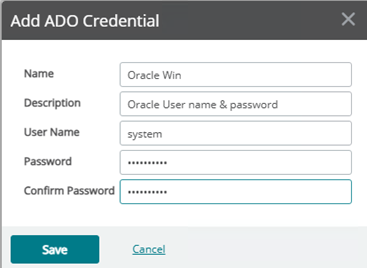
Figure 1 : ADO for Windows
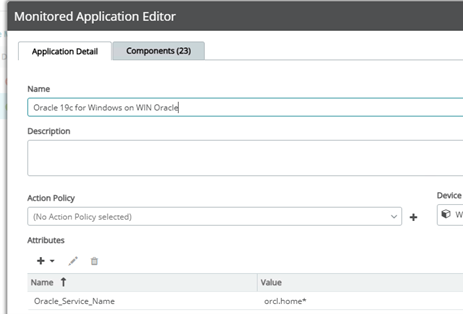
Figure 2 Service name orcl.home
DEBUG – Listener
In case of an error on TNS :

Figure 3 Error listener
Modify if necessary the Host addresses for listening :
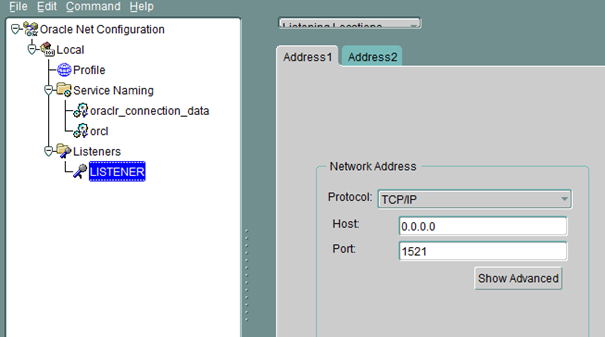
Figure 4 netmgr listener config
Check netstat on Oracle Windows server ( netstat -a ) to see if you are listening and accepting WUG connection :

Figure 5 Netstat check port listening
listener trace ( listener.log) :
Listening on: (DESCRIPTION=(ADDRESS=(PROTOCOL=tcps)(HOST=WIN-F4I7B2JTNED)(PORT=5500))(Security=(my_wallet_directory=C:\USERS\ADMINISTRATOR\DESKTOP\admin\orcl\xdb_wallet))(Presentation=HTTP)(Session=RAW))
20-MAY-2025 01:57:36 * (ADDRESS=(PROTOCOL=tcp)(HOST=127.0.0.1)(PORT=49829)) * service_register * orcl * 0
2025-05-20T01:57:39.018826-07:00
20-MAY-2025 01:57:38 * (CONNECT_DATA=(SERVICE_NAME=orcl.home)(CID=(PROGRAM=C:\Program?Files??x86?\Ipswitch\WhatsUp\nmpoller.exe)(HOST=WIN-VUEC5VIO304)(USER=SYSTEM))) * (ADDRESS=(PROTOCOL=tcp)(HOST=192.168.1.95)(PORT=61916)) * establish * orcl.home * 0
2025-05-20T01:57:57.309386-07:00
20-MAY-2025 01:57:57 * service_update * orcl * 0
Then by changing the host addresses we got the connection :

Figure 6 WUG connection successful
DEBUG – Username/password
In case of an error on username/password :

Figure 7 WUG error login infos
You will have in the listener trace ( listener.log) :
20-MAY-2025 02:04:50 * (ADDRESS=(PROTOCOL=tcp)(HOST=192.168.1.95)(PORT=63903)) * <unknown connect data> * 12537
TNS-12537: TNS:connection closed
TNS-12560: TNS:protocol adapter error
TNS-00507: Connection closed
DEBUG – SID
An SID error conduct to a connection request time out :

Figure 8 WUG error timeout
The listener trace ( listener.log) show :
20-MAY-2025 02:23:32 * (CONNECT_DATA=(SERVICE_NAME=orcl.home_erreur)(CID=(PROGRAM=C:\Program?Files??x86?\Ipswitch\WhatsUp\nmpoller.exe)(HOST=WIN-VUEC5VIO304)(USER=SYSTEM))) * (ADDRESS=(PROTOCOL=tcp)(HOST=192.168.1.95)(PORT=52586)) * establish * orcl.home_erreur * 12514
TNS-12514: TNS:listener does not currently know of service requested in connect descriptor
LINUX Environnement
Context
Versionning is :
- WhatsUp Gold 24.0.3
- Oracle 19c – Oracle LINUX Server
Parameters
The connection with Oracle need :
- Host
- SID – Oracle Service name
- User name / Password of the Oracle Database
Also on Oracle server we need to have the listener open for the connection with WhatsUp Gold
Check $(ORACLE_HOME)\network\admin\tnsnames.ora & $(ORACLE_HOME)\network\admin \listener.ora
Check also the listener trace file
Default : db_home\log\diag\tnslsnr\(HOST)\listener\trace
Configuration
On WUG we need to add :
- ADO credential
- Service name within the application profile :
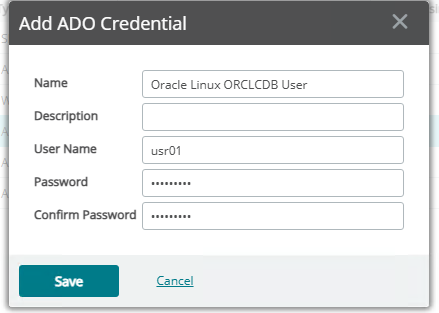
Figure 9 ADO Oracle LINUX user of the Database
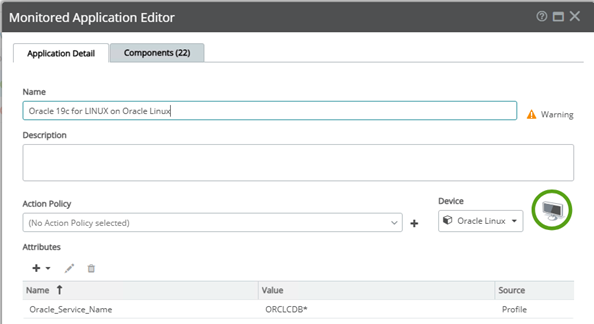
Figure 10 Service ORCLCDB in WUG APM
DEBUG – Tools
You have different tools and files to help on the Oracle environment :
- Config files
- Listener.ora
- tnsnames.ora
- Trace file
- db_home\log\diag\tnslsnr\(HOST)\listener\trace
- Application
- Sqlplus , check access to the database
- Netmgr , check configuration files
- Dbca , check database configuration
- lsnrctl , check listener status
- tnsping, check whether a connection can be established with a LISTENER
DEBUG – Listener
A common situation, a connection timeout :

Figure 11 WUG Timeout
Check firewall , and possibly “systemctl stop firewalld”
Check listener tracefile :

Figure 12 trace file error
The message indicate that we need to modify listener.ora to add a descriptor
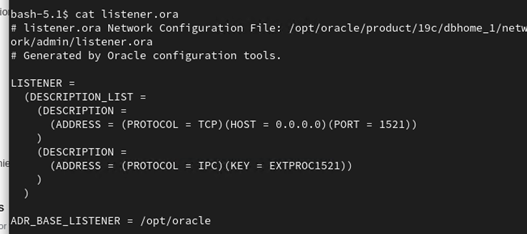
Figure 13 listener.ora file
We add SID_LIST_LISTENER
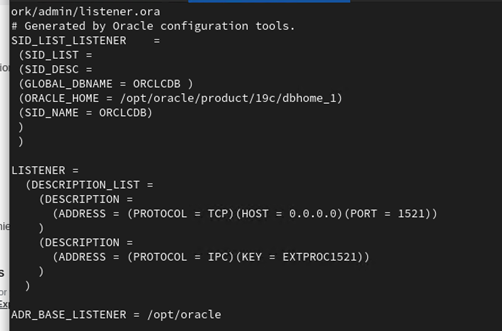
Figure 14 Listener.ora add SID_LIST_LISTENER
Then we could apply to the listener the configuration
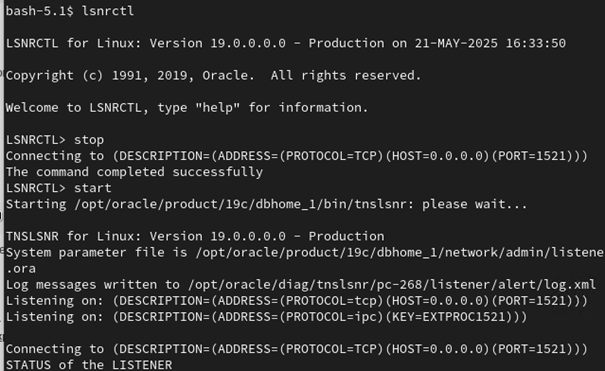
UNKNOWN status of ORCLCDB in lsnrctl status means that; the instance is registered statically (with a SID_LIST) in the listener.ora file rather than dynamically with service registration. Therefore, the database status is « not known » to the listener.
DEBUG – USER
Sometimes there is a confusion between Linux user and database user . This conduct to have an error ORA-01017:

The listener trace file is responding correctly

So we will check with a new user in the database :
Creation of a user on CDB ( instead of PDB )
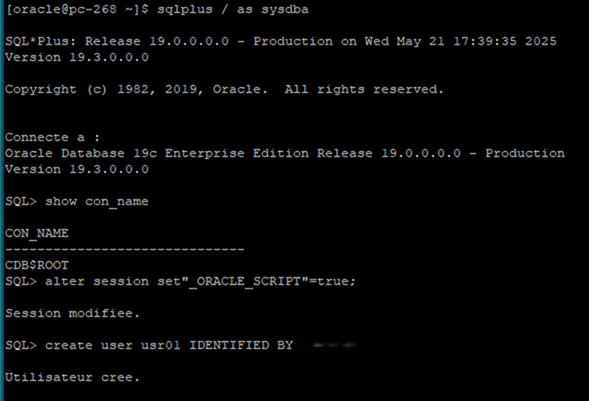
Please also check the rights associated

We grant rights to usr01
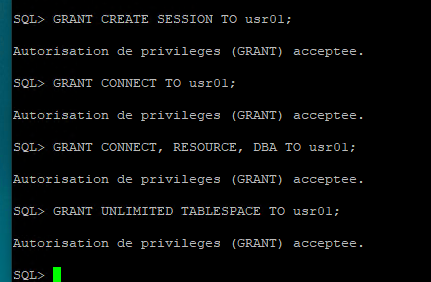
ORACLE tools
Netmgr & Config files
- Listener.ora
- tnsnames.ora
The basic configuration is visible in netmgr :
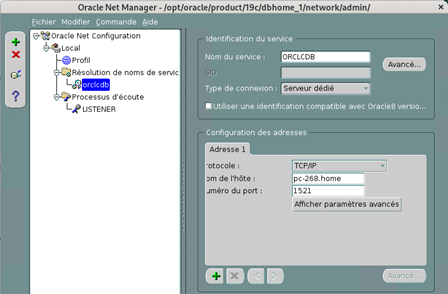
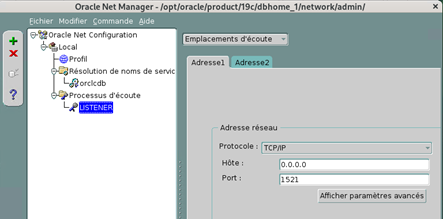
DBCA
You could check the configuration ( especially the dedicated server )
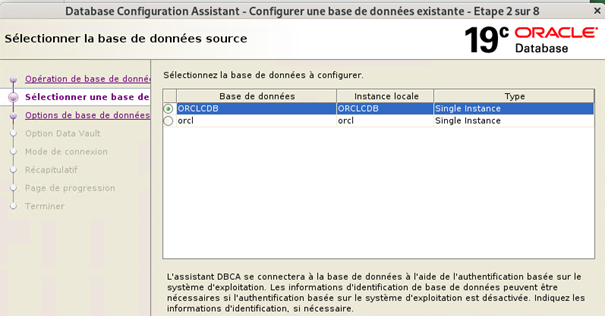
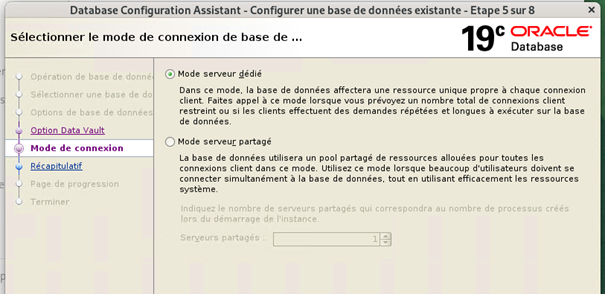
lsnrctl
You will start, stop and check status of the listener .
The list of commands : https://docs.oracle.com/cd/E11882_01/network.112/e10835/lsnrctl.htm#NETRF001
Sqlplus
You will :
- start the database :
- sqlplus /nolog
- connect / as sysdba
- startup
- exit
- check the connection
- show con_name
- create a user
tnsping
You will :
- check the connectivity with the listener
- tnsping ORCLCDB